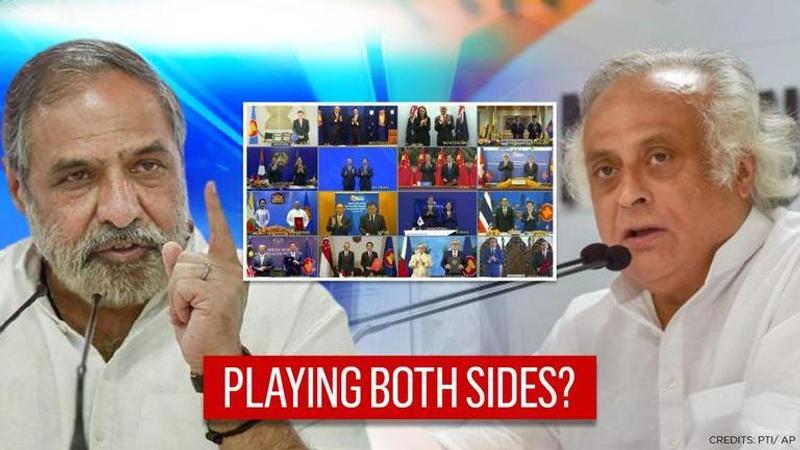Published 13:07 IST, November 18th 2020
Congress plays both sides as India stays out of RCEP deal; Ramesh blocks, Sharma tackles
Following India's decision to stay out of RCEP, Congress party leaders have played both sides by putting forth opposing views. Here are some of them

Advertisement
Fifteen Asia-Pacific nations on Sunday had signed what is being billed as the world's biggest trade agreement, the Regional Comprehensive Economic Partnership (RCEP). However, India has decided to stay out of it raising concerns over unfavourable terms that would allow, among other things, potential flooding of imported goods in the country. Following the development, Congress leaders have opined on the move by playing both sides on the RCEP decision.
RCEP Trade Deal: Congress takes both sides
Commenting on the RCEP trade deal, Congress leader Anand Sharma termed India's decision of staying away from the deal as 'unfortunate and ill-advised'. He stated that the deal would have cemented India's strategic and economic interests in the Asia-Pacific integration. He further added that India could have been a part of the RCEP by ensuring safeguards in order to protect the country's interests. Sharma has termed the decision as a 'backward leap'.
India's decision of not joining Regional Comprehensive Economic Partnership (RCEP) is unfortunate and ill advised. It is in India's strategic and economic interests to be a part of the process of Asia- Pacific integration.
— Anand Sharma (@AnandSharmaINC) November 17, 2020
Withdrawal has negated years of persuasive negotiations for India to be accepted as part of RCEP. We could have negotiated safeguards to protect our interests. Keeping out of the RCEP is a backward leap.
— Anand Sharma (@AnandSharmaINC) November 17, 2020
However, contrary to Anand Sharma's opinion over India not being a part of RCEP, Congress leader Jairam Ramesh has expressed a subtle relief over India's decision. Jairam Ramesh on Twitter has mentioned that in 2019 he had voiced against India playing part in RCEP. In addition, Ramesh had apparently termed the deal as '3rd jhatka for the economy' referring to the demonetisation and GST. The Congress leader has justified the country's decision pertaining to the RCEP as just.
On Oct 21 2019 I had described India's imminent membership of RCEP as 3rd jhatka for the economy after demonetisation & botched GST. A year later the position @INCIndia took then in demanding that the PM not drag India into an unfair RCEP, as was being planned, stands vindicated.
— Jairam Ramesh (@Jairam_Ramesh) November 17, 2020
Anand Sharma and Jairam Ramesh are not the only Congress leaders who have opposing takes on the RCEP. Earlier on Monday, former Finance Minister P Chidambaram asserted that there are pros and cons to India joining/not joining RCEP. Chidambaram said that the RCEP debate regarding India's position has never been brought up in Parliament or among the people or opposition parties.
"It is another bad example of centralised decision-making unacceptable in a democracy," he wrote, months after India decided it would not be joining.
RCEP born, it is the world’s largest trading body
— P. Chidambaram (@PChidambaram_IN) November 16, 2020
15 nations in our region are members of RCEP, India is not among them
There are pros and cons to India joining RCEP. But the debate has never taken place in Parliament or among the people or involving the Opposition parties
— P. Chidambaram (@PChidambaram_IN) November 16, 2020
It is another bad example of centralised decision-making unacceptable in a democracy
India stays out of RCEP
India, one of the leading consumer-driven market in the region, pulled back from the talks last year, concerned that the elimination of tariffs would open its markets to a flood of imports that could harm local producers. But other nations have said in the past that the door remains open for India's participation in the RCEP, influenced by China. The RCEP was first proposed in 2012 and loops in 10 ASEAN economies- Indonesia, Malaysia, the Philippines, Singapore, Thailand, Brunei, Vietnam, Laos, Myanmar and Cambodia- along with China, Japan, South Korea, New Zealand and Australia.
The virtual ASEAN summit, which kicked off last Thursday, took place amid China's aggressive measures in the disputed South China Sea. A number of ASEAN countries have ongoing territorial disputes with China in the South China Sea. Beijing claims almost all of the 1.3 million square-mile South China Sea as its sovereign territory. China has been building military bases on artificial islands in the region which, in parts, is claimed by Brunei, Malaysia, the Philippines, Taiwan and Vietnam. Beijing has impeded commercial activity like fishing and mineral exploration by neighbouring nations in recent years, saying the ownership of the resource-rich maritime territory belongs to China for hundreds of years.
13:07 IST, November 18th 2020




